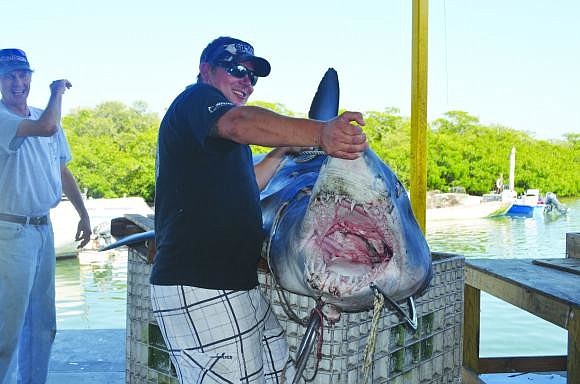- April 19, 2024
-
-
Loading

Loading

Tony Musca, Ryan Roberts and Sam Von Duhn have quite the shark tale.
On April 23, they caught a 692-pound shortfin mako shark approximately 20 miles off of Longboat Pass in 100-foot water during a fishing trip with Double Nickel Charters that left out of Marina Jack in Sarasota.
The 12-year-olds, who were vacationing with their families from Bay View, Ohio, were catching amberjack when they spotted the shark. They rigged a shark line and used the amberjack as bait before they finally reeled in the ferocious fish after a 30-minute fight.
“We were surprised by how big it was,” Tony said.
The charter boat returned to Cortez Bait & Seafood late that afternoon, and the shark was weighed at Cortez Kitchen nearby.
The famed “Jaws” quote, “We’re gonna need a bigger boat,” did not apply here, because the group was on board a 42-foot Buddy Harris.
A week before the catch off of Longboat Pass, three men caught a 805-pound mako shark near the Panhandle. Charter boat Nick Froelich said it’s the third shark Double Nickel Charters has caught this year.
A great white shark was also spotted on the northern tip of Anna Maria Island in March.
“This is the sharkiest year we’ve ever seen,” Froelich said.
If the shark had been caught commercially, the meat — which tastes similar to swordfish, according to Froelich — could fetch $4 to $5 per pound. But because the shark was caught recreationally, the meat will not be sold.
“We pass it out and give it to a lot of different people,” Froelich said. “Last time, we had a dock party open to anyone. Very little goes to waste.”
The Longboat Observer was unable to reach Robert Hueter, director of the Center for Shark Research at Mote Marine Laboratory, who is in Cuba through Wednesday. In an interview with WSTP 10 News, Hueter said:
“This, in part, is good news for sharks. Some of these shark species are coming back. There are larger ones seen offshore. It’s not a problem along the beach. It’s a sign some of our fishery management is working, bringing back shark populations that have been depleted by 75% in the last 25 years.”